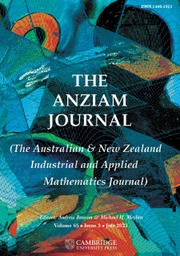No CrossRef data available.
Article contents
New algorithms for discrete-time optimal control problems
Published online by Cambridge University Press: 17 February 2009
Abstract
Core share and HTML view are not available for this content. However, as you have access to this content, a full PDF is available via the ‘Save PDF’ action button.
The paper presents new demonstrably convergent first-order iterative algorithms for unconstrained discrete-time optimal control problems. The algorithms, which solve the linear-quadratic problem in one iterative step, are particularly suited for solving nonlinear problems with linear constraints via penalty function methods. The proofs of the reduction of cost at each iteration and convergence of the algorithms are provided.
- Type
- Research Article
- Information
- Copyright
- Copyright © Australian Mathematical Society 1984
References
[1]Dyer, P. and McReynolds, S. R., The computation and theory of optimal control (Academic, New York, 1970).Google Scholar
[2]Gershwin, S. B. and Jacobson, D. H., “A discrete-time differential dynamics programming algorithm with application to optimal orbit transfer’, AIAA J. 8 (1970), 1616–1626.Google Scholar
[3]Heidari, M., Chow, V. T., Kokotovć, P. V. and Meredith, D. D., “Discrete differential dynamic programming approach to water resources systems optimization”, Water Resources Res. 7 (1971), 273–282.Google Scholar
[4]Jacobson, D. H. and Mayne, D. Q., Differential dynamic programming (Elsevier, New York, 1970).Google Scholar
[5]Luenberger, D. G., Optimization by vector space methods (John Wiley and Sons, New York, 1969).Google Scholar
[6]Nedeljković, N. B., “New algorithms for unconstrained nonlinear optimal control problems”, IEEE Trans. Automat. Control 26 (1981), 868–884.Google Scholar
[7]Ohno, K., “A new approach to differential dynamic programming for discrete-time systems”, IEEE Trans. Automat. Control 23 (1978), 37–47.Google Scholar
[8]Tennessee Valley Authority, “Development of water resources management methods for the TVA reservoir system”, Project status June, 1976. Prelim. Rep. (Knoxville, Tennessee, 1976).Google Scholar
[9]Teo, K. L., Wong, K. H. and Clements, D. J., “Optimal control computation for linear time lag systems with linear terminal constraints”, J. Optim. Theory Appl. (to appear).Google Scholar
[10]Wong, K. H. and Teo, K. L., ‘A conditional gradient method for a class of time-lag optimal control problems’, J. Austral. Math. Soc. Ser. B 25 (1984), 518–537.Google Scholar


